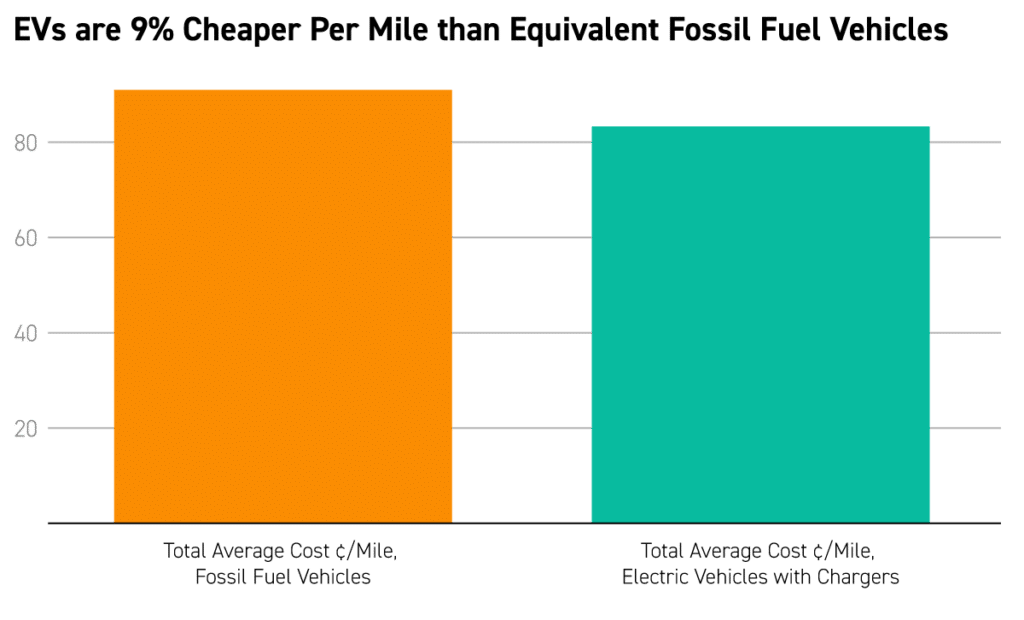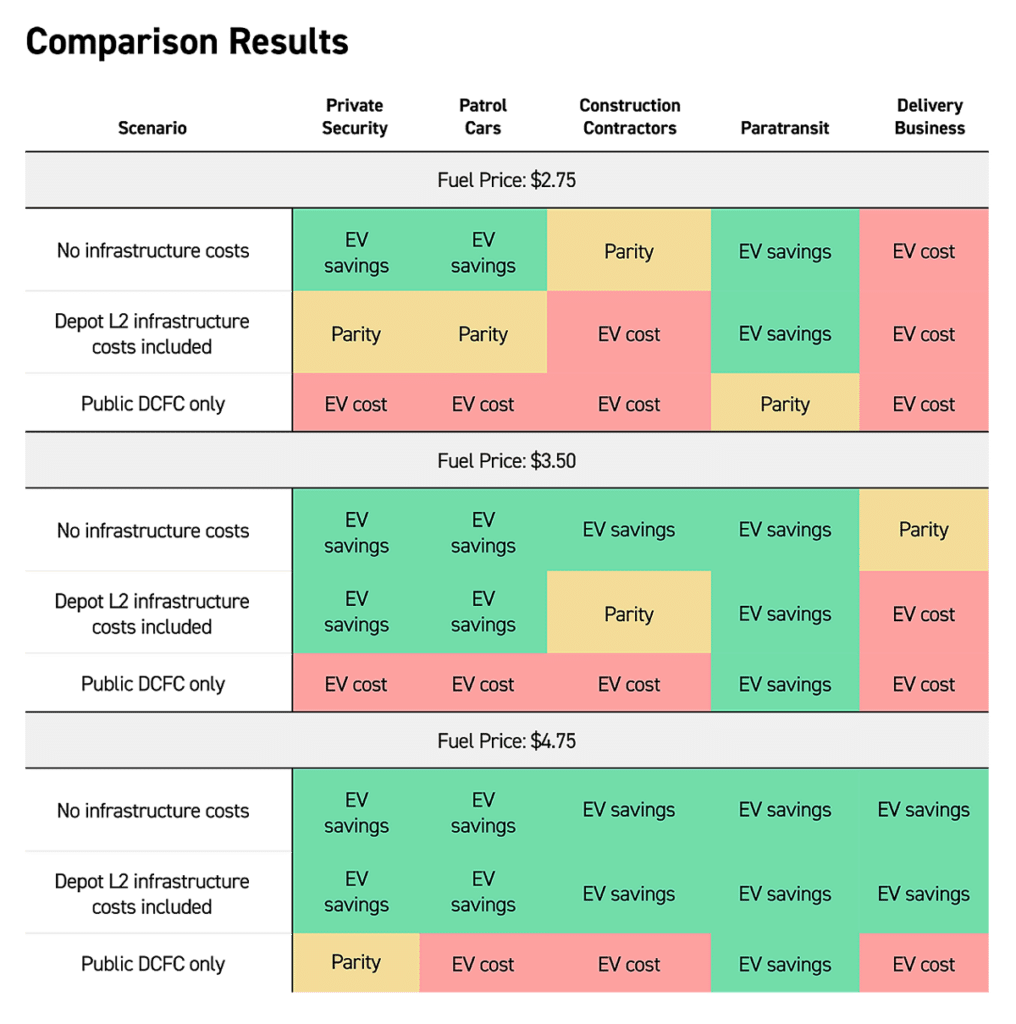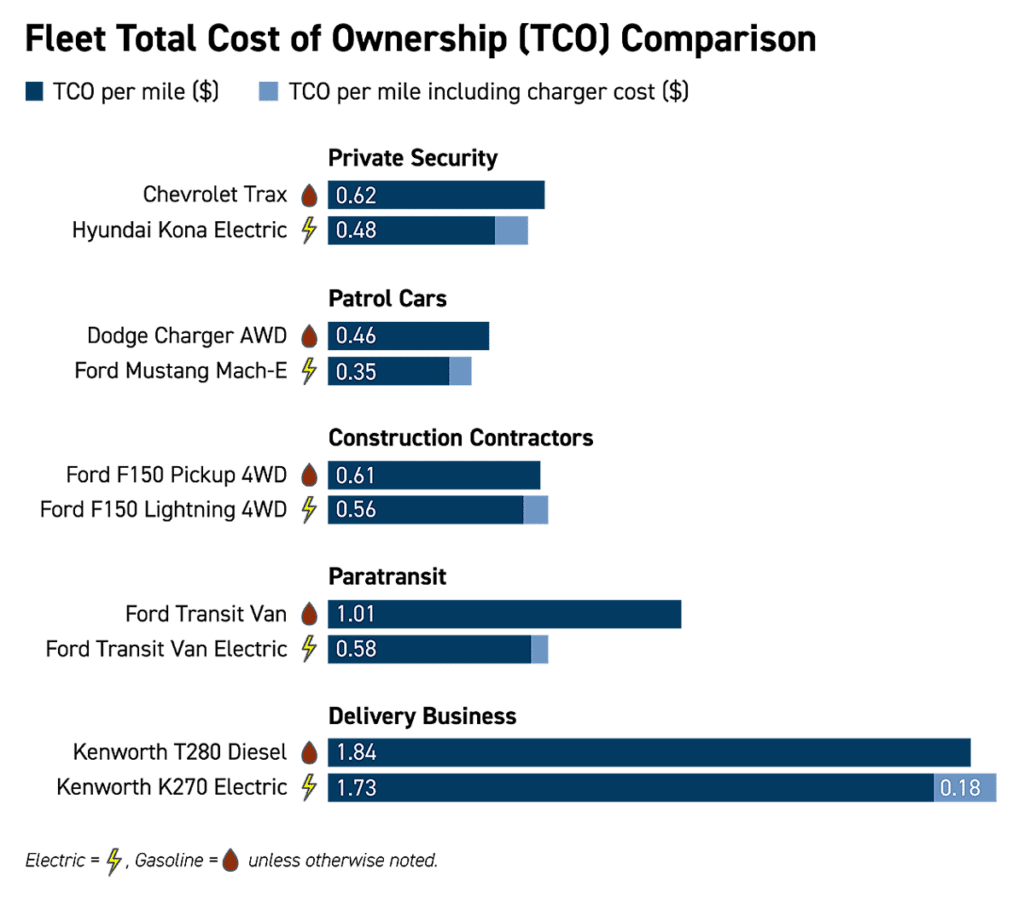According to RMI, a leading nonprofit think tank formerly known as the Rocky Mountain Institute, recent technological advancements and federal tax incentives make it an ideal time for fleet owners to transition to electric vehicles (EVs) and optimize their EV fleet TCO.
Using the Dashboard for Rapid Vehicle Electrification (DRVE) tool, developed by Atlas Public Policy and the Electrification Coalition, RMI analyzed several common fleet scenarios and found that electric vehicles often offer a lower total cost of ownership (TCO) than comparable fossil fuel-based fleets. The TCO for EVs includes the vehicle purchase price as well as all costs related to charging, operation, and maintenance over the vehicle’s lifetime.
In this post, we’ll dive into RMI’s findings and explore how fleet owners can further reduce EV fleet TCO by leveraging Charging-as-a-Service (CaaS).
Key Findings from the Analysis Regarding EV Fleet TCO
RMI’s analysis used the DRVE tool to model TCO across various scenarios based on the following factors:
- Industry/Vehicle Type: The analysis compared typical internal combustion engine (ICE) vehicles with their electric counterparts across industries like private security, patrol, construction, paratransit, and large delivery services.
- Fuel Costs: The study compared the cost of electricity, gasoline, and diesel.
- Charging Infrastructure Costs: The TCO was calculated with and without the cost of building and operating depot-based charging infrastructure.
- Charging Location: RMI considered three charging options:
- No Infrastructure Costs: Fleet owners who partner with a CaaS provider, such as Electrada, avoid upfront capital costs for charging infrastructure and enhance their EV fleet TCO.
- Depot-Based Level 2 Chargers: Fleet owners manage their own charging infrastructure.
- Public DC Fast Chargers: The fleet uses only public fast chargers.
Why Now Is the Best Time to Electrify Your Fleet
RMI’s analysis reveals that, in most cases, electric vehicles are either less expensive or on par with Internal Combustion Engine (ICE) vehicles in terms of TCO. The report found that the average TCO for EVs is $0.83 per mile, compared to $0.91 per mile for ICE vehicles — a savings of 9%.

While RMI’s analysis included current federal tax incentives for EVs and charging infrastructure, the actual EV fleet TCO may be even lower in states that offer additional incentives for EV adoption.
Why Are EVs Cheaper?
The primary drivers behind the lower TCO for EVs are fuel costs and smart charging strategies. Historically, electricity prices have been lower and less volatile than fossil fuel prices. Additionally, EVs are more energy-efficient and require less “fuel” to operate.
RMI’s analysis found that, when fuel costs rise to $3.50 per gallon or higher, and when fleets engage a CaaS provider for charging infrastructure, EV fleet TCO in all five industries was equal to or less than that of ICE vehicles.

Heavy-Duty Fleets Benefit the Most
Delivery fleets, such as those using Kenworth T280 diesel tractors, realized the greatest savings by switching to electric. For example, the Kenworth K270 Electric model has a TCO that is $0.18 per mile lower than the ICE version when fleet owners pay for their own charging infrastructure.

EV fleet TCO can be even lower under a CaaS agreement, where the provider covers all capital costs for charging infrastructure. Electrada’s 360 CaaS model, for example, offers predictable pricing that shields fleets from fluctuating energy costs. Electrada also optimizes charging strategies, selects the best equipment, and handles upgrades and ongoing maintenance.
How Electrada Can Help EV fleet TCO
Electrada’s 360 CaaS offers a seamless, cost-effective, and reliable electric fueling solution with a 99% uptime guarantee. Get in touch to learn more about how we can help reduce your fleet’s TCO and support your transition to electric vehicles.



